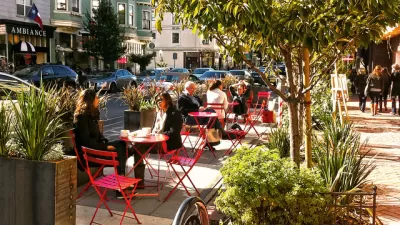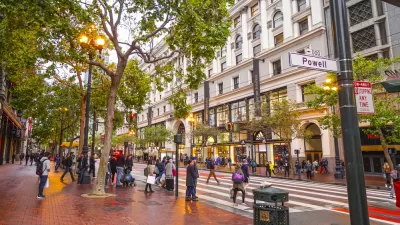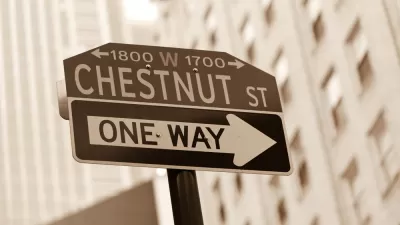A new study from Drexel University's Lindy Institute for Urban Innovation surveys the obstacles and challenges making it more difficult to build car-free public spaces, like plazas and parklets, in Philadelphia.

"Plazas and parklets — parking spaces repurposed for other uses — remain a relative rarity in Philadelphia, and a new study has determined that a lack of staff, funding and leadership, and a convoluted bureaucracy contribute to keeping neighborhoods from embracing these improvements," according to an article by Jason Laughlin.
Despite the wide variety of options available for transforming public space currently devoted to automobile travel or storage, barriers to entry remain at almost every step of the process in Philadelphia, according to a new report by researchers from Drexel University, with help from officials at the city.
According to Laughlin, "the study found people consistently didn’t have enough information about how to apply to build a parklet or plaza, lacked money to invest in one, and were confused by the city’s processes. A flow chart of the city’s application to create a parklet or plaza showed an eight-step odyssey through city agencies and public approvals that offered no clear sense of cost or specifics about what was needed for a site to gain approval. Reviewing an application could take days or a year, depending on how busy the relevant agencies are."
The article includes more on the benefits of parklets and plazas, and local examples of processes that have achieved completion in Philadelphia despite the myriad challenges that stood in the way.
FULL STORY: When it comes to adapting street space for pedestrians, Philly needs a better road map

Study: Maui’s Plan to Convert Vacation Rentals to Long-Term Housing Could Cause Nearly $1 Billion Economic Loss
The plan would reduce visitor accommodation by 25,% resulting in 1,900 jobs lost.

North Texas Transit Leaders Tout Benefits of TOD for Growing Region
At a summit focused on transit-oriented development, policymakers discussed how North Texas’ expanded light rail system can serve as a tool for economic growth.

Using Old Oil and Gas Wells for Green Energy Storage
Penn State researchers have found that repurposing abandoned oil and gas wells for geothermal-assisted compressed-air energy storage can boost efficiency, reduce environmental risks, and support clean energy and job transitions.

San Mateo Formally Opposes Freeway Project
The city council will send a letter to Caltrans urging the agency to reconsider a plan to expand the 101 through the city of San Mateo.

A Bronx Community Fights to Have its Voice Heard
After organizing and giving input for decades, the community around the Kingsbridge Armory might actually see it redeveloped — and they want to continue to have a say in how it goes.

Houston Mayor Promises Dedicated Austin Street Bike Lane After Public Backlash
Although the one-way bike lane won’t be protected by physical barriers, the proposal is an improvement over the mayor’s initial plan to only include sharrows on the Austin Street project.
Urban Design for Planners 1: Software Tools
This six-course series explores essential urban design concepts using open source software and equips planners with the tools they need to participate fully in the urban design process.
Planning for Universal Design
Learn the tools for implementing Universal Design in planning regulations.
Borough of Carlisle
Caltrans
Heyer Gruel & Associates PA
Institute for Housing and Urban Development Studies (IHS)
City of Grandview
Harvard GSD Executive Education
Toledo-Lucas County Plan Commissions
Salt Lake City
NYU Wagner Graduate School of Public Service





























